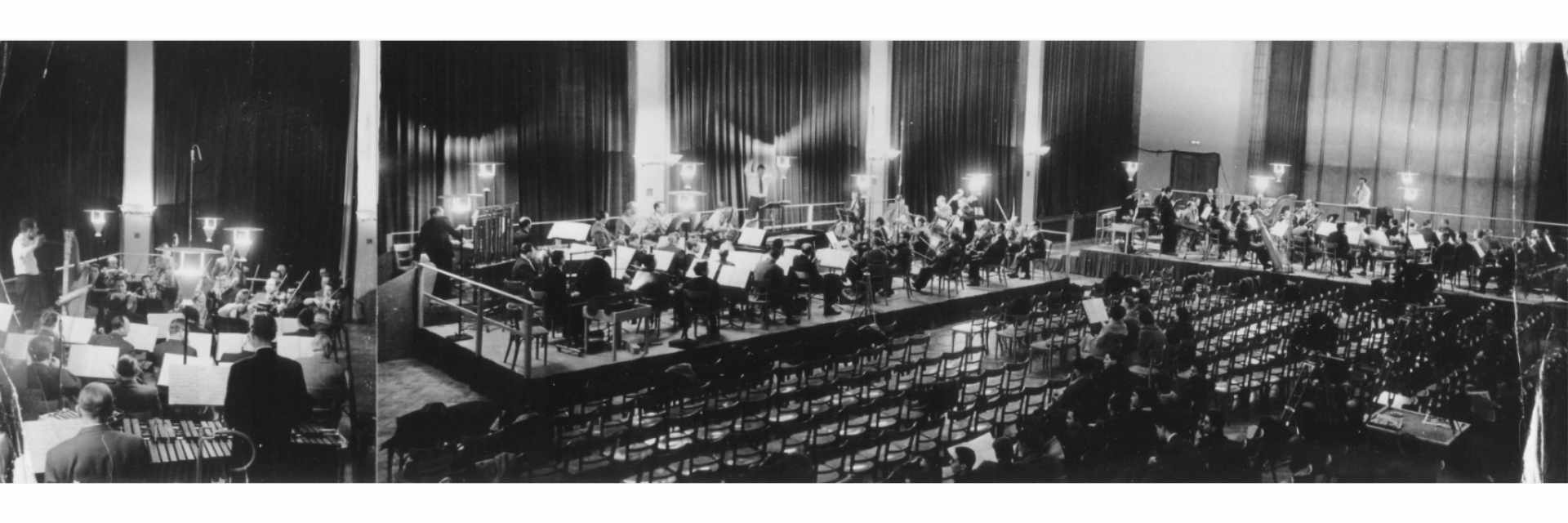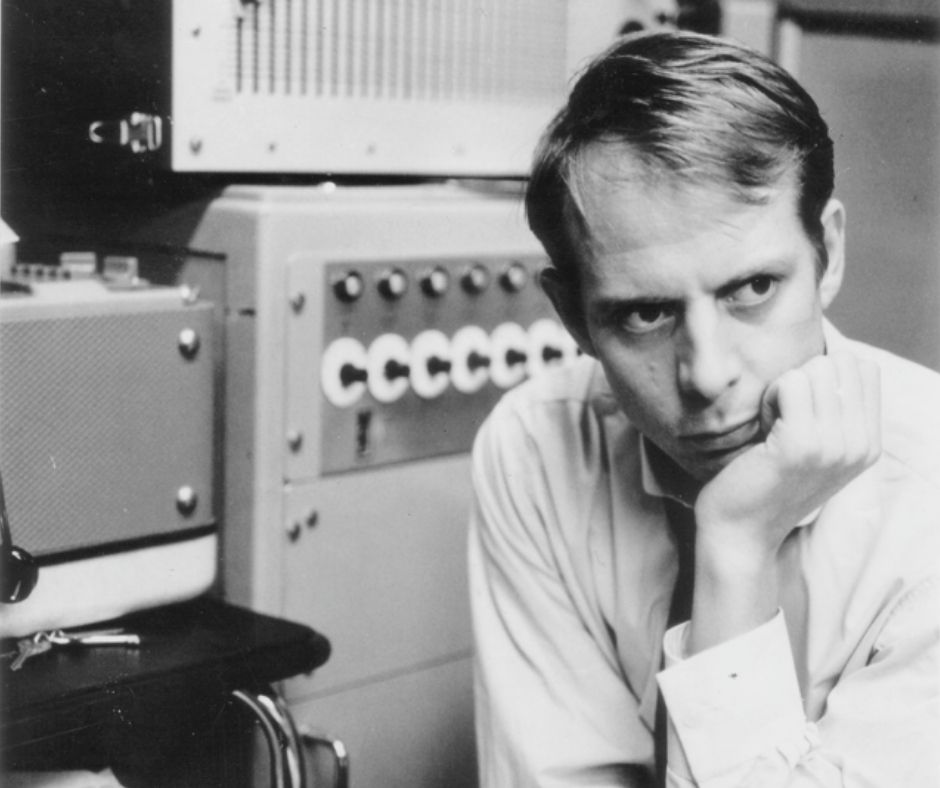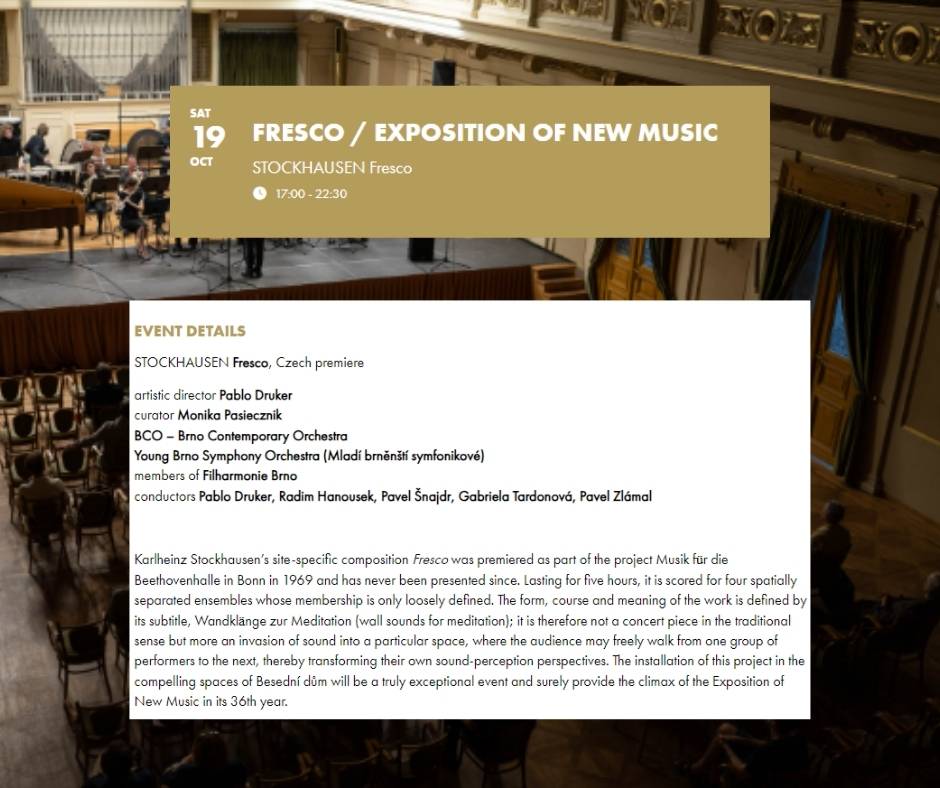
Karlheinz Stockhausen: "Fresco" and the Sound of the Avant-Garde

Karlheinz Stockhausen: "Fresco" and the Sound of the Avant-Garde
On the occasion of the upcoming performance of Karlheinz Stockhausen's rarely performed work "Fresco" in Brno on 19 October 2024, we present an introduction to the radical sound universe of one of the most important composers of the 20th century. The performance as part of the Exposition of New Music is a rare opportunity to experience this extraordinary work live, which is very rarely performed due to its high demands.
Further information and tickets can be found here:
An introduction to the radical sonic universe of one of the most significant composers of the 20th century.
The Visionary: Who was Karlheinz Stockhausen?
Karlheinz Stockhausen, born in 1928 in Mödrath near Cologne, is regarded as one of the most influential composers of the post-war era and a pioneer of New Music. With a radical approach, he broke the conventional boundaries of music and opened up new dimensions in sound design. Stockhausen was not only a composer but a musical visionary who fundamentally changed the foundations of music.
His early experiences, marked by the turmoil of World War II and the loss of his parents, shaped his path and philosophy. Particularly significant for his musical development was his study with Olivier Messiaen and his participation in the Darmstadt Summer Courses for New Music. This period established him as a leading figure of the European avant-garde.
In Stockhausen's work, rigorous structuring is combined with a deep fascination for new sound worlds. Especially through serial music, which organizes not only pitches but also rhythm, dynamics, and timbre, he pushed the boundaries of composition. However, unlike many of his contemporaries, he did not remain confined to serialism, continually seeking new ways to expand and radically transform music.
"Fresco": A Work of Open Forms
"Fresco," composed in 1969, is a groundbreaking piece in Stockhausen's oeuvre and a prime example of the "open form" concept. Unlike conventional works, which prescribe clearly structured sequences, "Fresco" offers the performers considerable freedom. It belongs to Stockhausen’s so-called "musics for the duration," meaning it has no fixed length and could theoretically be played indefinitely.
The work is based on a collection of sound modules that the musicians can play in different sequences according to specific instructions. These modules are fluidly connected without fixed guidelines regarding timing or dynamics, allowing each performance to take on a unique, individual shape.
"Fresco" challenges the traditional role of the composer as the sole authority over the work. The musicians become co-creators, incorporating their own interpretations and spontaneous decisions into the performance. This experimental approach represents a completely new concept of composition and interpretation, influencing numerous later composers.
The Sonic Universe of "Fresco"
The sounds in "Fresco" are far removed from the traditional musical forms familiar from classical repertoire. While Stockhausen uses conventional instruments in this work, the way they are played is anything but ordinary. Additionally, electronic sounds, which had just become a regular part of his work in the 1960s, and unconventional playing techniques expand the timbres.
The work is characterized by continuous changes in sound. Instead of fixed melodic structures, Stockhausen creates an atmosphere in which sound is experienced as a dynamic, constantly shifting element. The sounds seem to float, breaking away from conventional forms and developing an almost cosmic quality.
The title "Fresco" already suggests that the work is to be understood more as a kind of sonic painting, where the colors (sounds) are freely distributed and appear in unpredictable combinations. This makes every performance a one-of-a-kind experience and opens the listener’s ears to an entirely new, abstract world of sound.
Significance for Music History
"Fresco" marks a significant turning point in New Music. The concept of open form, which Stockhausen pushes to the extreme here, questioned the role of the composer and the performer. While traditionally the composer was seen as the supreme authority, dictating every detail of the work, Stockhausen opened up new possibilities for collaboration between composer and musician.
This approach of "controlled freedom" influenced an entire generation of composers, who sought new ways to structure music while allowing for freedom. Particularly in the experimental music scene of the 1960s and 1970s, the idea of open form gained immense importance.
"Fresco" also reflects Stockhausen’s broader interest in the idea of "music as process." For him, music was not just a finished artwork but a living, ever-evolving event. This contrasts with traditional concepts that view music as a fixed structure to be performed "correctly" by the musician.
The Composition Process: A Play of Freedom and Structure
For Stockhausen, the creative process was never linear. He was always searching for new challenges and ways to organize sound. In the case of "Fresco," this meant finding a balance between strict structure and improvisational freedom. The musicians were given clear instructions, but within those, they had the freedom to move.
This approach required not only technical skill from the musicians but also creativity and a heightened sensitivity to the overall performance. While many compositions rely on a linear dramatic structure, "Fresco" is designed to immerse the listener in a flow of sound, without a clear goal. Instead, the focus is on experiencing the moment and the transformation of sounds.
Stockhausen Today: Why You Should Listen to "Fresco"
Even more than 50 years after its premiere, "Fresco" remains a fascinating work that challenges and captivates the listener. It is music that functions not through intellect, but through experience. The combination of sonic diversity and structural openness makes the work a unique experience, taking the listener on an acoustic journey of discovery.
Those who listen to "Fresco" will quickly realize that it is less about hearing melodies and more about immersing oneself in a world of sounds that constantly change and reform. It is music that demands much but also rewards generously.
In a time when many works of classical modernism are still considered inaccessible and difficult, "Fresco" shows that experimental music can be a deeply moving and aesthetic experience if one is willing to embrace the unconventional.
Conclusion: An Invitation to a Sonic Journey of Discovery
"Fresco" is a milestone in New Music and a work that challenges both performers and listeners. The revolutionary ideas of Karlheinz Stockhausen, his vision of open form, and his innovative sound language make the work an extraordinary experience. Those willing to engage with Stockhausen’s world of sound will embark on an acoustic journey that goes far beyond the conventional boundaries of music.
"Fresco" is not just music; it is an experience that transports the listener to a new dimension of sound.
This article was created with the help of generative AI

